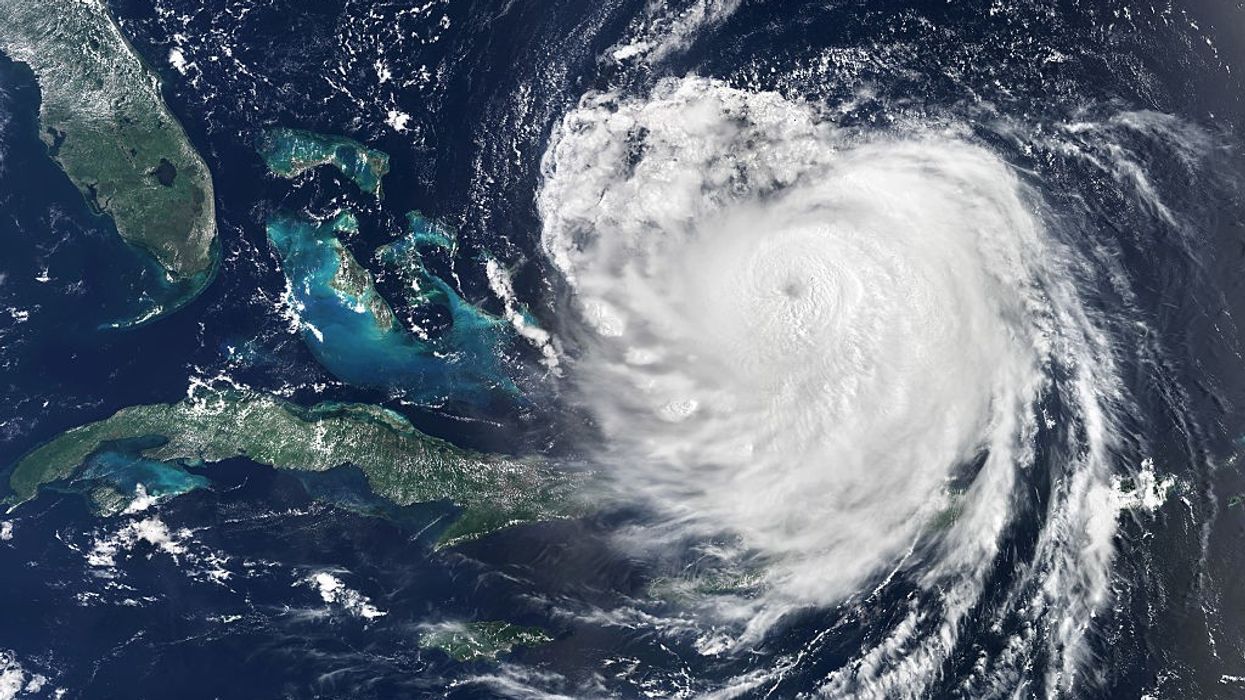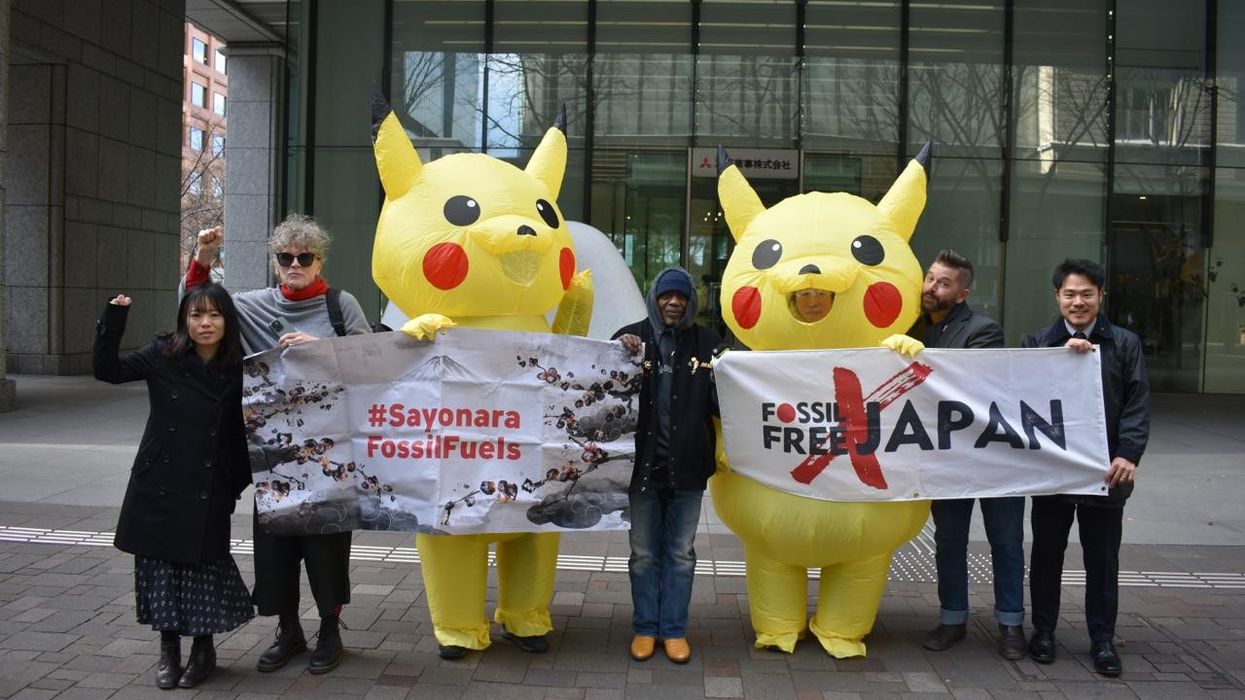Trump, Fossil Fuels, and Insurers Are Making Hurricane Season Even More Dangerous
With the federal government abdicating its responsibility, state and local leaders must step up. They have the power and duty to act.
A deadly storm has already claimed at least 120 lives and caused widespread devastation in Texas. Hurricane Erin has now unleashed catastrophic flooding in North Carolina before racing toward the Northeast—and hurricane season has only just begun. Storms are growing more destructive, driven by fossil fuels that warm our oceans and destabilize the climate, while the vulnerable petrochemical infrastructure in their path multiplies the danger. As the storms strengthen, US protections are unraveling, leaving millions exposed.
Every year, hurricanes grow more intense—fueled by warming oceans and a rapidly changing climate driven by fossil fuels. But it’s not just the storms becoming more dangerous. It’s the fossil fuel infrastructure in their path. It’s the toxic pollution released when storms strike. It’s the insurance companies abandoning communities in the aftermath. And it’s the US government retreating from its duty to protect.
The Gulf Coast—home to more than 84% of US plastics’ production and to nearly half of US petroleum refining capacity—is bracing for more than five major hurricanes predicted for the Atlantic Ocean this year. With each hurricane comes the risk of fires, explosions, and toxic releases—not just for these facilities, but for the surrounding communities. More than 870 highly hazardous chemical facilities are located within 50 miles of the hurricane-prone Gulf Coast, and more than 4 million residents and 1,500 schools sit within a 1.5-mile radius of a high-risk chemical facility in the region.
Nationally, 39% of the US population lives within 3 miles of a high-risk chemical facility.
And yet, as we brace for the next deadly storm, US President Donald Trump has axed critical weather forecasting jobs and announced plans to eliminate the Federal Emergency Management Agency (FEMA) altogether, leaving communities even more vulnerable in the face of escalating disaster.
But the threats don’t stop there. The US government is systematically dismantling our first line of defense. Since Trump took office in 2024, the administration has:
- Cut staff at the National Oceanic and Atmospheric Administration and the National Weather Service, weakening our ability to forecast storms and warn the public;
- Dismantled the Chemical Safety Board, which investigates chemical disasters to prevent future ones;
- Proposed rolling back the Risk Management Program (RMP), which requires nearly 12,000 high-risk chemical facilities to plan for disasters, protect workers, and inform communities;
- Warned they will phase out FEMA, leaving frontline communities to weather storms and rebuild without aid; and
- Deleted the RMP public data tool, cutting off public access to health and safety information.
A Climate of Injustice
Fossil fuel infrastructure isn’t just at risk during storms—it supercharges the storms themselves. The industry is a major driver of global warming, accelerating the rising temperatures and warming oceans that exacerbate hurricanes. And even as storms grow more destructive, the industry is doubling down: 80% of proposed new petrochemical projects are sited within 20 miles of a hurricane or tropical storm’s path over the past decade. This means entire corridors already battered by climate disasters are being locked into even greater danger.
When disaster strikes, oil, gas, and petrochemical facilities release hazardous pollutants into the air and water, compounding the crisis for nearby communities, which are often low-income and disproportionately Black, brown, and Indigenous.
When Hurricane Katrina struck, it slammed into 466 facilities that handle hazardous chemicals and petrochemicals. More than 200 onshore releases of hazardous chemicals, petroleum, or natural gas were reported. The storm caused at least 10 oil spills, releasing more than 7.4 million gallons of oil into Gulf Coast waterways—more than two-thirds the volume spilled during the Exxon Valdez disaster, one of the worst in US history. Together, Hurricanes Katrina and Rita, just a month apart, shut down nearly a quarter of the country’s refining capacity.
And during Hurricane Harvey, Houston’s petrochemical plants and refineries released millions of pounds of pollutants. Flooding at the Arkema Petrochemical plant disabled the plant’s refrigeration system, triggering a massive explosion that sent black plumes and toxic fumes into the skies and forced evacuations across a community already on edge. An investigation by the Chemical Safety Board—recently dismantled by the Trump administration—determined that requirements of the Environmental Protection Agency’s Risk Management Program—currently being rolled back by the EPA—could have prevented this very disaster.
A Rigged System
As extreme weather events surge, so do insurance premiums—while coverage vanishes for those living in harm’s way.
For many climate-vulnerable communities, home insurance is no longer affordable—or available. Since 2019, US home insurance rates have jumped nearly 38%. Louisiana, Texas, and Pennsylvania—all major fossil fuel corridors—rank among the top six most expensive states to insure a home. Home insurance premiums rose by 10% or more across 40 states from 2021 to 2024. Renters aren’t immune as landlords pass along skyrocketing insurance costs.
Insurance math: Communities facing hurricanes, flooding, and fires? Too risky to insure. Companies driving the disasters? Coverage and cash.
Insurers claim payouts from climate disasters are driving up costs. The truth is, insurers are investing in the very industries making those disasters worse—and raking in profits. In Louisiana, insurance companies are making $55 in profits for every $1 in underwriting losses. This profitability is not unique: NAIC data shows the property and casualty sector made an all-time high of $167 billion profits in 2024—up 91% from 2023, and 330% from 2022.
At the same time, the US insurance industry continues to bankroll fossil fuels, holding more than $500 billion in fossil fuel-related assets as of 2019 (the most recent data set available); a pattern of investing that is unlikely to have substantially changed since. While refusing to insure homeowners in climate-exposed communities, many insurers are simultaneously underwriting new fossil fuel infrastructure. At least 35 insurance companies are backing methane gas (LNG) export terminals across the Gulf South—some of the very same companies, including AIG, Chubb, and Liberty Mutual, that are raising premiums or pulling out of the housing market in vulnerable regions entirely.
Insurance math: Communities facing hurricanes, flooding, and fires? Too risky to insure. Companies driving the disasters? Coverage and cash.
Rather than confronting the crisis, insurance companies are fueling it—protecting profits and abandoning people. This isn’t just hypocrisy, it’s a business model, one built on extraction and shifting costs onto the public.
The system is rigged. Those most responsible are rewarded, while those most vulnerable are left to suffer the storms alone.
Lead Now or Pay Later: States Must Decide
We all deserve somewhere safe to live—free from the dread of the next hurricane, the next explosion, or the next rollback of basic protections. But fossil fuel polluters—and the insurance companies profiting from their harm—are robbing us.
We will not accept this endless cycle of crisis. We deserve safety, especially from the governments whose duty it is to protect us. We deserve safety from storms and from toxic spills. We deserve a government that protects its people—and agencies that do their jobs: defending public health and the environment, not doing the bidding of polluters.
With the federal government abdicating its responsibility, state and local leaders must step up. They have the power and duty to act. It’s time for states, especially those in the eye of the storm, to lead where the federal government is failing. States must:
- Enforce strong petrochemical safety rules;
- Stop new fossil fuel expansion in at-risk communities;
- Hold polluters accountable for the harms they cause; and
- Refuse to let insurance companies cherry-pick who gets covered while abandoning those most in need.
When Hurricane Katrina devastated Louisiana, it left behind a $170 billion bill. The federal government stepped in for $120 billion. But with FEMA on the chopping block, that kind of relief may never come again. If federal protections vanish, the financial and human cost of the next disaster will fall squarely on states—and the people who live in them.
The climate crisis isn’t waiting. The storms are here. Will our leaders meet the moment—or leave us to weather the disaster alone?


